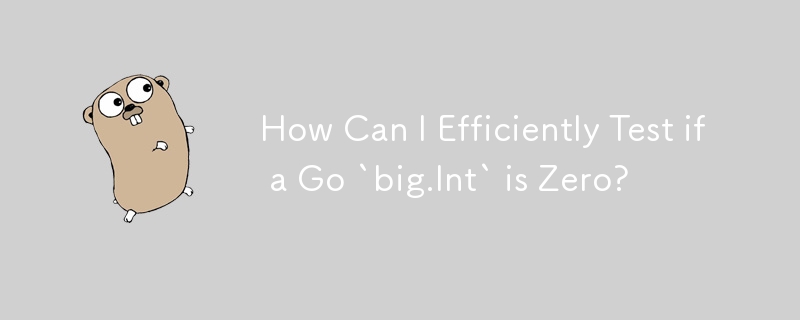Home >Backend Development >Golang >How Can I Efficiently Test if a Go `big.Int` is Zero?
How Can I Efficiently Test if a Go `big.Int` is Zero?
- DDDOriginal
- 2024-11-25 03:24:14479browse

Efficient Methods for Testing if a big.Int is 0
When working with big integers in Go, it's crucial to test for the value 0 efficiently. The traditional approach involves comparing the big.Int to another big.Int representing 0 (e.g., using Cmp(zero) == 0). However, there are faster alternatives that leverage the underlying representation of big.Ints.
Using Raw Bytes (Bytes Access)
big.Int exposes the Int.Bits() function, which provides access to the raw bytes of the integer representation. This is a fast method as it avoids copying the underlying data. By checking the length of this byte slice, we can determine if the big.Int is 0:
if len(i1.Bits()) == 0 {
// i1 is 0
}
Using Bit Length
Alternatively, we can use the Int.BitLen() function, which returns the number of significant bits in the big.Int. Since the bit length of 0 is 0, we can test for zero as follows:
if i1.BitLen() == 0 {
// i1 is 0
}
Benchmark Results
Benchmarking these techniques against the traditional comparison method reveals significant performance improvements:
- Getting the raw bytes and checking the length is approximately 20 times faster.
- Using Int.BitLen() is around 10 times faster.
Testing for 1 Using Low-Level Properties
A similar optimization can be applied for testing if a big.Int is equal to 1. However, since 0 has unique properties, this optimization is not as significant:
func isOne(i *big.Int) bool {
bits := i.Bits()
return len(bits) == 1 && bits[0] == 1 && i.Sign() > 0
}
Benchmarking this technique against the traditional comparison shows an approximately 10x performance increase.
Conclusion
The methods outlined above provide efficient ways to test if a big.Int is 0 or 1, leveraging the low-level properties of the representation and improving performance compared to traditional comparison approaches. These techniques can enhance the speed of code that manipulates large integers, particularly in time-critical applications.
The above is the detailed content of How Can I Efficiently Test if a Go `big.Int` is Zero?. For more information, please follow other related articles on the PHP Chinese website!

